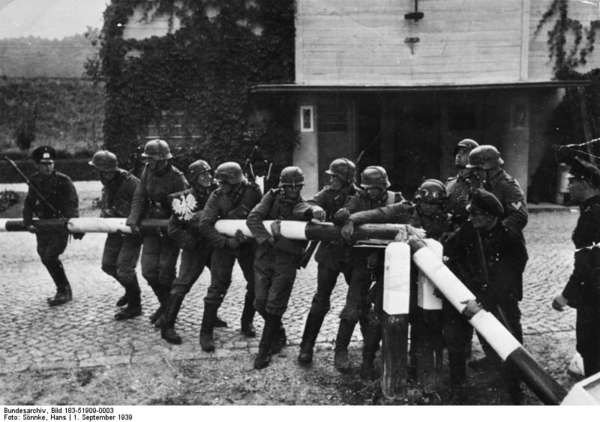The beginning of the Second World War
- 01. September 2019 - General, Germany, Historical Events, Knowledge, WWII
With the invasion of Poland on 01 September 1939 the Second World War broke out. 80 years later, we remember its up to 80 million victims. Many of our clients‘ family histories are directly linked to WW II, the German National Socialism and their aftermath.
The outbreak of WW II cannot be reduced to a single cause but roots in an accumulation of various circumstances. Some of them were the international and European constellation of power and politics after WW I, the rise and establishment of fascism in Europe, the cheap propaganda against the terms of the Treaty of Versailles, and the armament of the German Wehrmacht.
Without any Polish provocation and against international law the Wehrmacht supported by Slovak troups raided Poland on 01 September 1939. German propaganda justified the raid with an attack on the Gliwice Radio Tower and Station, taking place on 31 August 1939. It was however feigned. SS-Obergruppenführer Richard Heydrich gave order to raid the station on 10 August 1939, to provide the international press and German propaganda with a plausible explanation for the invasion of Poland.
Heydrich assigned SS-Sturmbannführer Alfred Naujocks with conducting the raid. It started at 08:00 p.m. when Naujocks attacked the station Gleiwitz in Upper Silesia together with five or six other SS members that masqueraded as Polish irregulars. Naujocks and the others cut off the radio feed from Breslau and announced that the radio station was now in Polish hands. There was one person killed in this raid that was supposed to be proof that the station was attacked by Polish irregulars.
As early as 10:30 p.m. the same day, the attack was announced on the German Reich’s broadcast and propagandistically utilized. The next day, Hitler mentioned the Gliwice attack and 14 other alleged border incidents in his speech in Reichstag, all of them were feigned.
On the same day, Hitler gave order to start the invasion of Poland at 04:45 a.m. However, until today it is disputed when exactly the first hostile actions took place. In any case, it is certain that the German Reich carried out air raids and acts of war on 01 September 1939.
The 06 October 1939 saw Polands’ capitulation in the face of massive German attacks violating human rights. The number of Polish victims of this military campaign can hardly be estimated: approximately between 66,000 and 100,000 Polish soldiers died, about 133,000 were wounded. The number of civilian casualties is unknown. 400,000 Polish soldiers and 200,000 civilians, denoted “suspicious elements”, were taken prisoners of war. Among them were 61,000 Jewish prisoners of war who were kept separated and treated even worse.
After the Polish capitulation many more human rights violations were committed, in Poland as well as in all other occupied territories, not to mention the atrocities against the Jewish and other minority populations. WW II claimed 60 to 80 million lives in total, dying directly or indirectly through actions of war. Until today, the Second World War impacts our lives. Jewish life in Germany was almost completely eradicated; many of the Jews surviving the Shoa emigrated from Germany for good. The separation of Germany into two countries and the Cold War resulted from WW II have continuously effected national and international relations. On a small scale, family histories mirror these historic events. Especially emigration and refugee flows before, during and after WW I are part of family fates that we are dealing with in our daily work.


0 comments